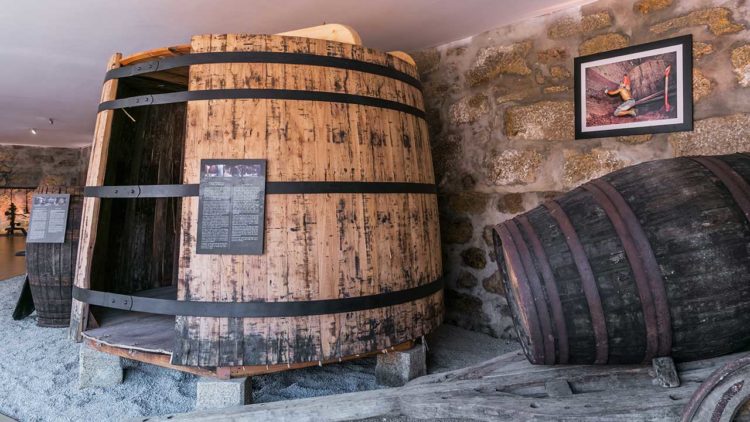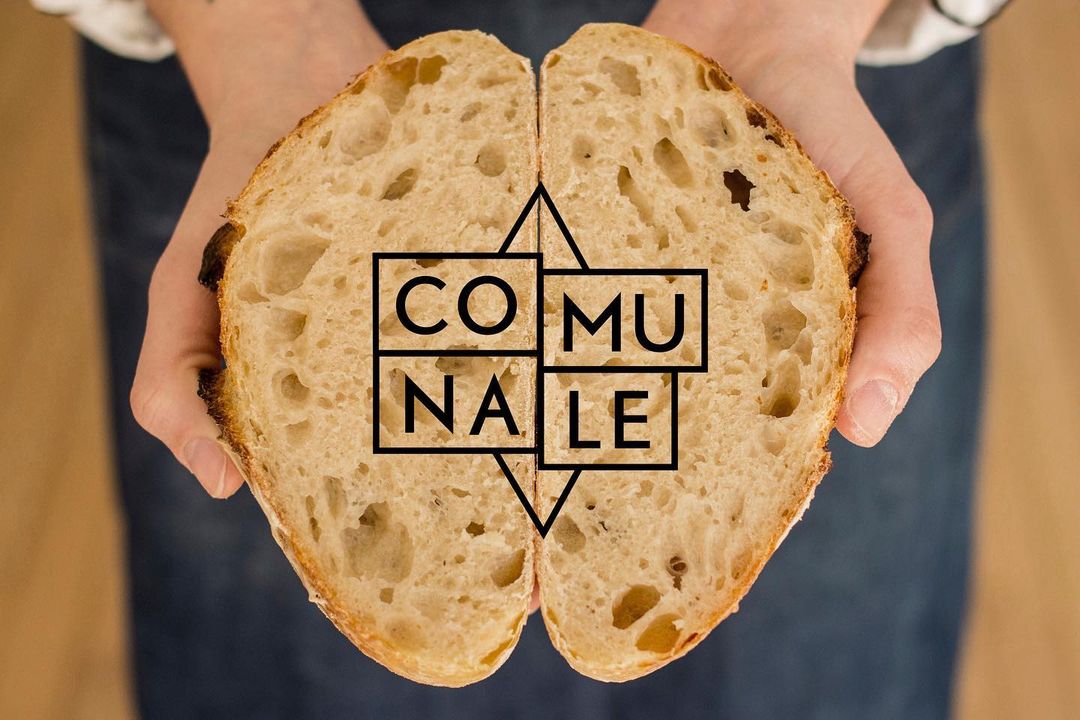
One Chef at a time – Meet Isa Cordaro, Chef at Comunale
This interview was conducted online during the pandemic, providing insights into the restaurant’s situation at that particular time. From Covid-19 to the food production chain and the opening of her new restaurant in a tumultuous 2020, Chef Isa Cordaro reveals her thoughts and feelings about food. Continue scrolling to read the original interview below (in portuguese).
Comunale opened during the coronavirus pandemic. It was the 6th restaurant that you opened in your career and the 2nd restaurant that you opened as the owner. What advice do you have for someone who wants to open a restaurant?
A restaurant is like a child and running a restaurant means that you will be busy all the time – you’ll think about your restaurant even when you take the day off. So it is important to be aware that this is a project that will make you miss some night’s sleep and force you to work hard.
I believe that good planning and setting money aside for the first months after opening are essential items.
The name of the restaurant – Comunale – suggests “communion, community, what can be shared”. How did you come up with the idea for the restaurant’s name?
We came up with this idea – “Comunale” – because it is a word that sounds the same in many languages (Italian, French and Spanish) although the spelling is sometimes different, which makes it easy to understand. We wanted to bring this idea of sitting down together to eat and share good times and communal meals together with family and friends. Our recipes are inspired by our family recipes, our roots.
We focus on our natural, slow-fermentation bread, which for us is the symbol of sharing.
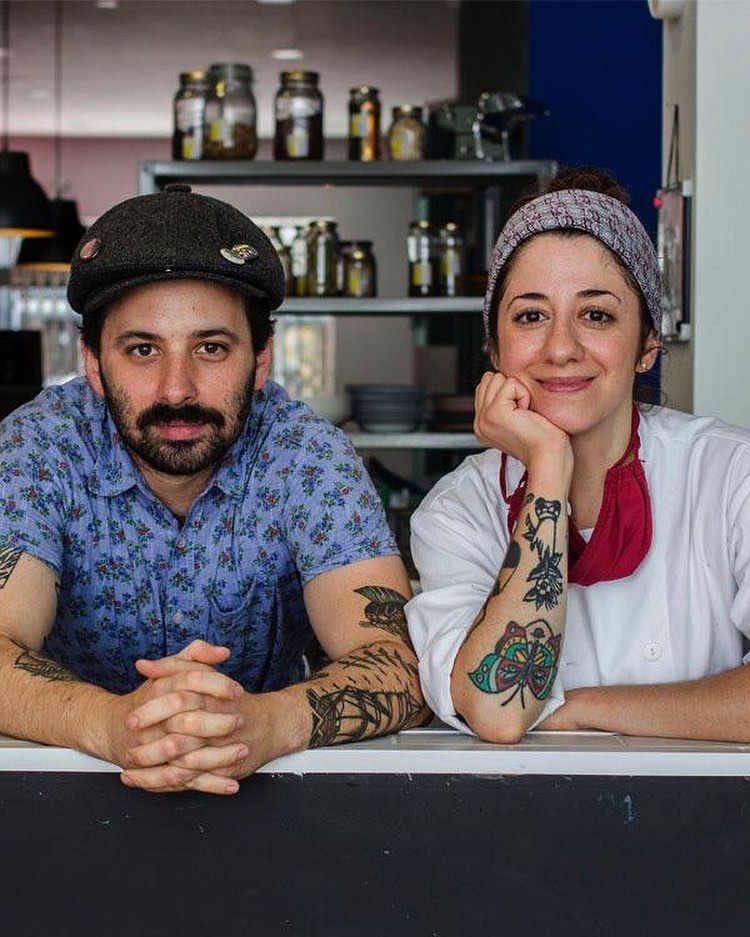
Portugal’s gastronomic tradition is proof that “eating” and “sharing” are practically synonymous. Our “petiscos” and the verb “petiscar” (generally best done with friends) are an example of this, which leads us to the question: Do you prefer to eat alone or with others?
With others, always! For me, kitchens are about food, love, making memories and a table surrounded by loved ones.
Sharing a meal, in my family, has always been a sacred thing: it was the moment when we all met after a full day, we talked, we had fun, we paid attention to what we were eating. That’s why this moment is so important for me.
Even when I’m eating alone, I try not to do it under pressure. I try to eat without distractions; I focus on the act of eating and not on my cell phone or tv instead.
Comunale has a menu inspired by “modern European cuisine” and every guest can see that there is a lot of respect for local ingredients. Do you believe that chefs have a role in safeguarding the national identity? And if so, in what way?
I believe so. The role of a chef has changed. Chefs do more than just prepare delicious food. Chefs have to think about the entire production chain which involves choosing a certain ingredient and this is, of course, a political decision.
In addition to respecting the ingredients (for example using every single part of an animal), it is essential to know where our food comes from. And this involves choices that are directly linked to a country’s gastronomic culture, its customs, traditions and national identity.
Brazil is a beautiful example of this. We have incredible chefs working on the ‘rescue’ of ingredients that, until that moment, were despised for not being considered “noble”; we also have some good examples of chefs working to preserve some species of vegetables that are at risk of extinction due to the agribusiness and that are no longer cultivated.
Choosing to buy from a small producer helps to safeguard the national identity and keep the local production chain alive.
In our restaurant menu, you won’t find traditional portuguese dishes. I leave it to the ones who are more knowledgeable about it, although I really like it. However, I use almost exclusively Portuguese products from small producers. We use certified Mirandesa meat, local flour ground in stone millstones and seasonal ingredients. Imported products are, after all, unsustainable and it is always possible to adapt any dish to the local ingredients, which makes it even more interesting.
Let’s imagine this is our first time in your restaurant. What is the one dish that I will regret not eating if I don’t eat it here?
This is a tough question because we don’t have a standard menu. The lunch menu, from Monday to Friday, changes every week and at dinner time we also work according to our inspiration and the availability of ingredients. You can visit us two or three times and you probably won’t eat the same dishes. There is only one meal that is repeated every month, which is the Gnocchi della Fortuna, on the 29 of every month. It is a Gnocchi made with orange and grilled sweet potatoes, pesto sauce and cherry confit tomatoes. There’s a high demand for it!
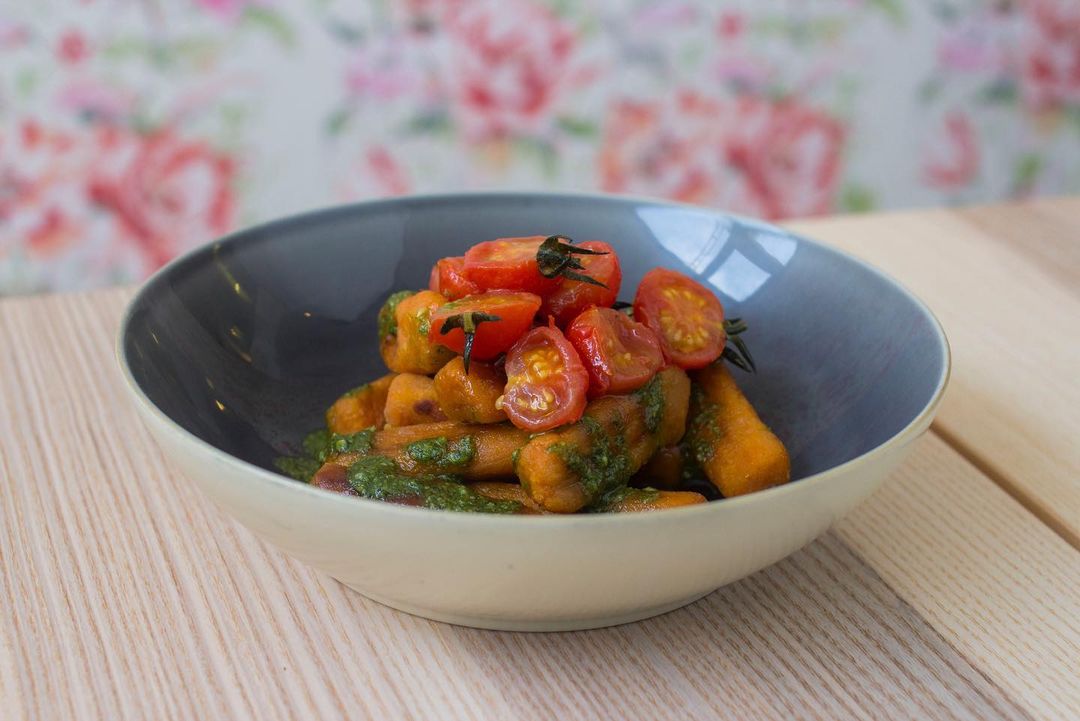
Is the “Takeout-and-Delivery-Only Model” very demotivating?
It is a difficult phase for everyone, but it is necessary to stop the spread of the pandemic and we know that collective collaboration is key. But it is a little frustrating not to have people eating inside, not to see the reaction when they are eating my food and not really knowing how the dish will get to my guests’ homes. We have to reinvent ourselves, find different menus and think about dishes that will arrive at the right temperature and in the right condition.
What is your favorite cuisine to cook?
I am very influenced by my Italian and Lebanese origins. These are the cultures that I’m most familiar with and that bring me fond memories. But French cuisine was very important in my culinary education as a professional cook. Through French cuisine, I learned the techniques and the theory and I keep coming back to French cuisine every time I have to consult or study something food-related.
Is there a meal that makes your eyes sparkle and shine?
My grandfather’s kibbeh nayyeh.
We know that you love traveling. What locale has surprised you the most?
Russia. I ate very well in that country and tried a few different dishes, which I didn’t know much about. It was surprising to get to know new flavors and eating habits.
When are you happiest at work?
When someone praises the meal I prepared and leave happier than they were before. This means that I achieved my goal of providing a positive experience and making someone happy for a moment.
If you never became a chef, in what other ways would you use your creativity?
I honestly think that cooking is the only thing I can do (haha) … I studied journalism but didn’t finish college. I think I would have followed a more academic path, giving classes, or being a researcher, I really like history and sociology.
Let’s end with a drink. You’re sitting down in your fantasy bar. What’s in your glass?
Lately, in my glass, there is a drink that Alex Miranda (my partner and companion) makes at Comunale restaurant, the Fitzgerald: gin, angostura and lemon. Very fresh and fragrant!
PORTUGUÊS: You can read the original interview below.
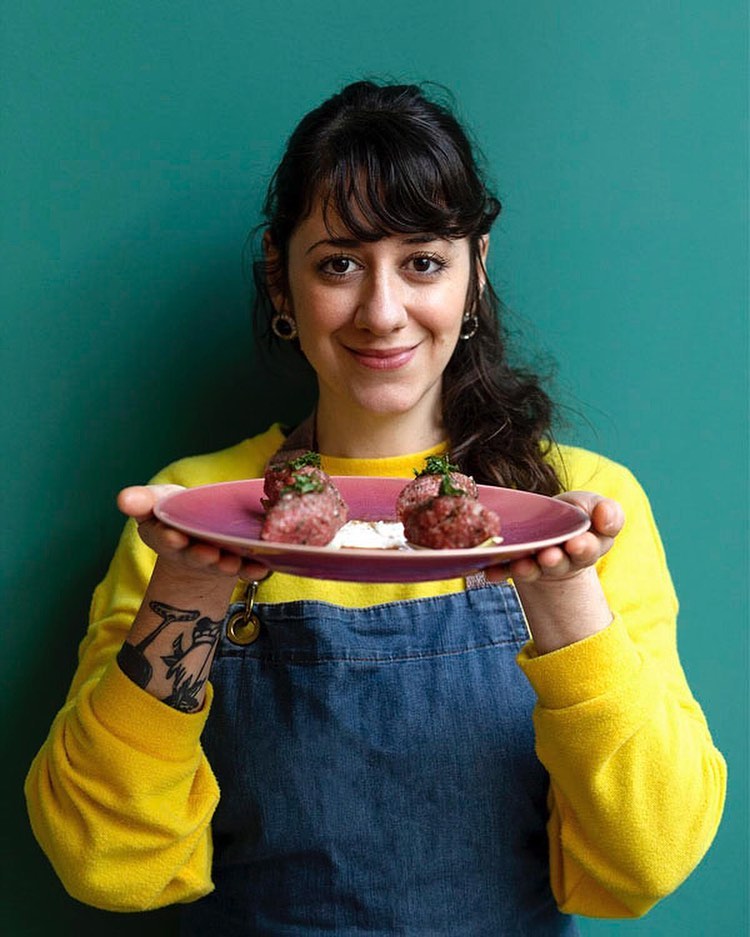
O Comunale abre no centro do Porto em pleno estado de emergência. Foi o 6.º restaurante que a Isa inaugurou na sua carreira e é o 2.º restaurante que abre enquanto fundadora. Que conselhos tem para alguém que quer abrir um restaurante?
Restaurante é como um filho, é uma atividade que toma todo teu tempo, e provavelmente você pensará nisso até quando está de folga. Então é importante ter essa consciência de que é um projeto que tirará muitas noites de sono e te obrigará a trabalhar muito mais. Acredito que um bom planejamento e um caixa para segurar alguns meses são itens fundamentais.
O nome do restaurante – Comunale – sugere “comunhão, comunitário, o que pode ser partilhado”. Como surgiu a ideia para este nome?
Pensamos em Comunale pois é um nome que está em algumas línguas como italiano, francês e espanhol – embora tenha diferenças na grafia – e, portanto, seria de fácil entendimento. Depois, porque o nosso conceito no restaurante é trazer essa ideia afetiva de sentar à mesa e partilhar com amigos e família bons momentos e bons pratos, já que a nossa inspiração vem de receitas de família e de nossas origens.
Focamos no nosso pão de fermentação natural e lenta, que para nós é o alimento símbolo de partilha.
A tradição gastronómica de Portugal prova que “comer” e “partilhar” são praticamente sinónimos na nossa cultura. Os “petiscos” e o o próprio verbo “petiscar” na companhia de amigos são disso exemplo. Tudo isto para lhe perguntar se prefere comer sozinha ou acompanhada?
Sempre acompanhada! Como disse, a cozinha para mim é bastante afetiva e me remete à mesa cheia de pessoas queridas. Minha família sempre considerou as refeições “sagradas”: era o momento em que todos nos encontrávamos depois de um dia cheio, conversávamos, nos divertíamos, prestávamos atenção naquilo que estávamos a comer, por isso para mim é tão importante este momento. Mesmo quando tenho que fazer alguma refeição sozinha, tento sempre que possível não fazer com pressa, ou a ver o telemóvel ou à televisão e sim concentrar-me naquilo que estou a comer.
O Comunale apresenta um menu inspirado na “cozinha europeia moderna” e onde se nota muito respeito pelos ingredientes locais. Acredita que os chefes de cozinha têm um papel na salvaguarda da identidade do país onde actuam?
Acredito que sim. O papel hoje em dia de um chef é muito mais que cozinhar bem, é pensar em toda a cadeia produtiva que envolve a escolha por determinado ingrediente, é uma decisão política.
Além da importância em ter respeito ao ingrediente, como por exemplo, usar todas as partes de um animal, é fundamental ter conhecimento da origem, de onde vem a nossa comida. E isso envolve escolhas que estão diretamente ligadas à cultura gastronômica de um país, refletindo em seus costumes, tradições e identidades.
O Brasil é um exemplo belíssimo neste aspecto, temos incríveis chefs trabalhando no resgate de ingredientes que até então eram desprezados por não serem considerados “nobres” ou mesmo na preservação de algumas espécies de vegetais, por exemplo, que estão em risco de extinção devido ao agronegócio e que deixaram de serem cultivadas. Então escolher comprar de um pequeno produtor é colaborar para esta cadeia continuar viva, mantendo a identidade de um território.
No meu menu não há pratos da cozinha portuguesa tradicional, prefiro deixar para quem é mais entendido nisso, embora goste imenso. Entretanto, opto quase que exclusivamente por produtos portugueses, de pequenos produtores. Usamos a carne Mirandesa certificada, farinha local moída em mós de pedra, procuro ingredientes da época. Produtos importados são além de tudo pouco sustentáveis e sempre é possível adaptar um prato com ingredientes locais,que o torna ainda mais interessante.
Vamos imaginar que esta é a nossa primeira vez no Comunale. Qual é o prato que vamos seguramente arrepender-nos de não ter experimentado?
Esta é uma pergunta difícil, porque não temos menu fixo! O menu de almoço, de segunda à sexta-feira, muda todas as semanas e aos jantares também trabalhamos conforme à nossa inspiração e à disponibilidade de ingredientes. Pode ir nos visitar duas ou três vezes e provavelmente não comerá os mesmos pratos. Há apenas um prato que se repete todos os meses, que é o Gnocchi della Fortuna, todos os dias 29. É um Gnocchi feito com batata doce laranja e grelhado, molho pesto e tomate cherry confit. E é bastante disputado!
Trabalhar apenas com take-away e entregas é muito desmotivador?
É uma fase difícil para todos, porém necessária para conter o avanço da pandemia e colaborar com o coletivo. Mas é um pouco frustrante não receber as pessoas no restaurante, não ver a reação quando estão a comer minha comida e não saber de fato como o prato chegará em suas casas. A todo tempo temos que nos reinventar a propor menus diferentes e a pensar em pratos que chegarão com a mesma qualidade.
Qual é a sua cultura gastronómica favorita para cozinhar?
Sou bastante influenciada pelas minhas origens, italiana e libanesa, são as culturas que me são familiares e tenho memórias afetivas. Mas a cozinha francesa é muito importante para a minha formação como cozinheira profissional, foi a que me fez estudar, praticar, ter técnica e a que sempre recorro nas minhas consultas ou estudos.
Qual é o prato que lhe coloca um brilhozinho nos olhos?
O kibbeh nayyeh do meu avô.
Sabemos que adora viajar. Até agora que país a surpreendeu mais em termos gastronómicos?
Rússia, comi muito bem e pratos bastante diferentes, que eu tinha pouca referência. Foi surpreendente conhecer novos sabores e hábitos alimentares.
O que a faz mais feliz no seu trabalho?
O melhor momento do meu trabalho é quando alguém elogia a refeição e sai satisfeito e surpreendido. Significa que atingi meu objetivo em proporcionar uma boa experiência e fazer alguém feliz por um momento.
Se não tivesse seguido este caminho, de que outra maneira acabaria a usar a sua criatividade?
Sinceramente acho que só sei cozinhar (haha)… Estudei também jornalismo, mas não concluí a faculdade. Acho que teria seguido um caminho mais acadêmico, dando aulas, ou sendo pesquisadora, gosto muito de história e sociologia.
Sabemos que também faz bons drinks. O que está no seu copo neste momento?
No meu copo ultimamente está um drink que o Alex Miranda (meu sócio e companheiro) faz no Comunale, o Fitzgerald: gin, angostura e limão. Bem fresco e perfumado!
